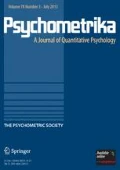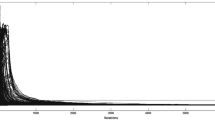Abstract
A model is presented for factor analysing scores on a set of psychological tests administered as both pre- and postmeasures in a study of change. The model assumes that the same factors underlie the tests on each occasion, but that factor scores as well as factor loadings may change between occasions. Factors are defined to be orthogonal between as well as within occasions. A two-stage least squares procedure for fitting the model is described, and generally provides a unique rotation solution for the factors on each occasion.
Similar content being viewed by others
References
Browne, M. W. Fitting the factor analysis model.Psychometrika, 1969,34, 375–394.
Corballis, M. C. Practice and the simplex.Psychological Review, 1965,72, 399–406.
Eckart, C. and Young, G. The approximation of one matrix by another of lower rank.Psychometrika, 1936,1, 211–218.
Evans, G. T. Factor analytic treatment of growth data.Multivariate behavioral Research, 1967,2, 109–134.
Fleishman, E. A. Factor structure in relation to task difficulty in psychomotor performance.Educational and Psychological Measurement, 1957,17, 522–532.
Fleishman, E. A. Abilities at different stages of practice in rotary pursuit performance.Journal of experimental Psychology, 1960,60, 162–171.
Fleishman, E. A. Human abilities and the acquisition of skill. In E. A. Bilodeau (Ed.),Acquisition of skill. New York: Academic Press, 1966. Pp. 147–167.
Garrett, H. E. A development theory of intelligence.American Psychologist, 1946,1, 372–378.
Harman, H. H. and Jones, W. H. Factor analysis by minimizing residuals (minres).Psychometrika, 1966,31, 351–368.
Harris, C. W. Canonical factor models for the description of change. In C. W. Harris (Ed.),Problems in measuring change. Madison, Wis.: Univ. Wis. Press, 1963. Pp. 138–155.
Harris, C. W. Some recent developments in factor analysis.Educational and Psychological Measurement, 1964,24, 193–206.
Hofstaetter, P. R. The changing composition of intelligence: a study in T-technique.Journal of genetic Psychology, 1954,85, 159–164.
Horst, P.Matrix algebra for social scientists. New York: Holt, Rinehart and Winston, 1963.
Hotelling, H. Analysis of a complex of statistical variables into principal components.Journal of educational Psychology, 1933,24, 417–441, 498–520.
Kaiser, H. F. and Caffrey, J. Alpha factor analysis.Psychometrika, 1965,30, 1–14.
Lawley, D. N. The estimation of factor loadings by the method of maximum likelihood.Proceedings of the Royal Society of Edinburgh, Series A, 1940,60, 64–82.
Lawley, D. N. and Maxwell, A. E. Factor transformation methods.British Journal of statistical Psychology, 1964,17, 97–103.
Meyer, W. J. and Bendig, A. W. A longitudinal study of the Primary mental Abilities Test.Journal of educational Psychology, 1961,52, 50–60.
Thurstone, T. G.Manual for the SRA Primary Mental Abilities. Chicago, Ill.: Science Research Associates, 1958.
Tucker, L. R. Implications of factor analysis of three-way matrices for measurement of change. In C. W. Harris (Ed.),Problems in measuring change. Madison, Wis.: Univ. Wis. Press, 1963. Pp. 122–137.
Author information
Authors and Affiliations
Additional information
We thank M. W. Browne, R. P. McDonald, R. Pruzek, and the Managing Editor for their constructive comments.
Rights and permissions
About this article
Cite this article
Corballis, M.C., Traub, R.E. Longitudinal factor analysis. Psychometrika 35, 79–98 (1970). https://doi.org/10.1007/BF02290595
Received:
Revised:
Published:
Issue Date:
DOI: https://doi.org/10.1007/BF02290595




